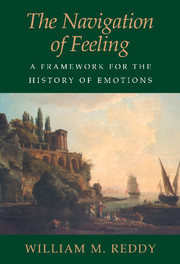Book contents
- Frontmatter
- Contents
- Preface
- Part I What are Emotions?
- 1 Answers from Cognitive Psychology
- 2 Answers from Anthropology
- 3 Emotional Expression as a Type of Speech Act
- 4 Emotional Liberty
- Part II Emotions in History: France, 1700–1850
- Conclusion
- Appendix A Detailed Review of Anomalous Cases from the Gazette des Tribunaux Sample
- Appendix B Detailed Review of Anomalous Cases from the Tribunal Civil de Versailles Sample
- References
- Index
3 - Emotional Expression as a Type of Speech Act
Published online by Cambridge University Press: 07 September 2009
- Frontmatter
- Contents
- Preface
- Part I What are Emotions?
- 1 Answers from Cognitive Psychology
- 2 Answers from Anthropology
- 3 Emotional Expression as a Type of Speech Act
- 4 Emotional Liberty
- Part II Emotions in History: France, 1700–1850
- Conclusion
- Appendix A Detailed Review of Anomalous Cases from the Gazette des Tribunaux Sample
- Appendix B Detailed Review of Anomalous Cases from the Tribunal Civil de Versailles Sample
- References
- Index
Summary
The conceptual difficulties that have emerged in the anthropology of emotions represent an opportunity. Because they stem in part from anthropology's openness to interdisciplinary influences, and the discipline's related political engagements, these difficulties can only be removed by a new theory of emotions of broad interdisciplinary significance. In this chapter, I will examine the philosophical difficulties that such a theory of emotions must overcome, and then lay out a theory that answers these difficulties.
FROM PROCESS TO TRANSLATION
Many would object that, in the last section of the preceding chapter, I made a fundamental error, and that, therefore, my pursuit of evidence of universal features of emotional regimes was entirely misguided. By finding evidence in ethnographic studies that supports the conclusions of laboratory tests, the argument would go, I have compared apples with oranges. Psychologists are engaged in an empirical science of the mind, of consciousness, or of experience (Cohen & Schooler 1997). To undertake such scientific inquiry, they must make certain assumptions, assumptions which are not necessary to ethnography and which may, themselves, be tainted by an inadmissible Western ethnocentrism (Lutz 1988; Lutz & Abu-Lughod 1990b; Gergen 1995). Doubtless ethnographic evidence about emotional ideals, rituals, gossip, and black magic is intriguing. But it cannot be used as a basis for a claim about universal features of emotional life, unless one has already established solid theoretical grounds for believing that certain aspects of human culture or experience might be universal.
Information
- Type
- Chapter
- Information
- The Navigation of FeelingA Framework for the History of Emotions, pp. 63 - 111Publisher: Cambridge University PressPrint publication year: 2001
Accessibility standard: Unknown
Why this information is here
This section outlines the accessibility features of this content - including support for screen readers, full keyboard navigation and high-contrast display options. This may not be relevant for you.Accessibility Information
- 1
- Cited by
